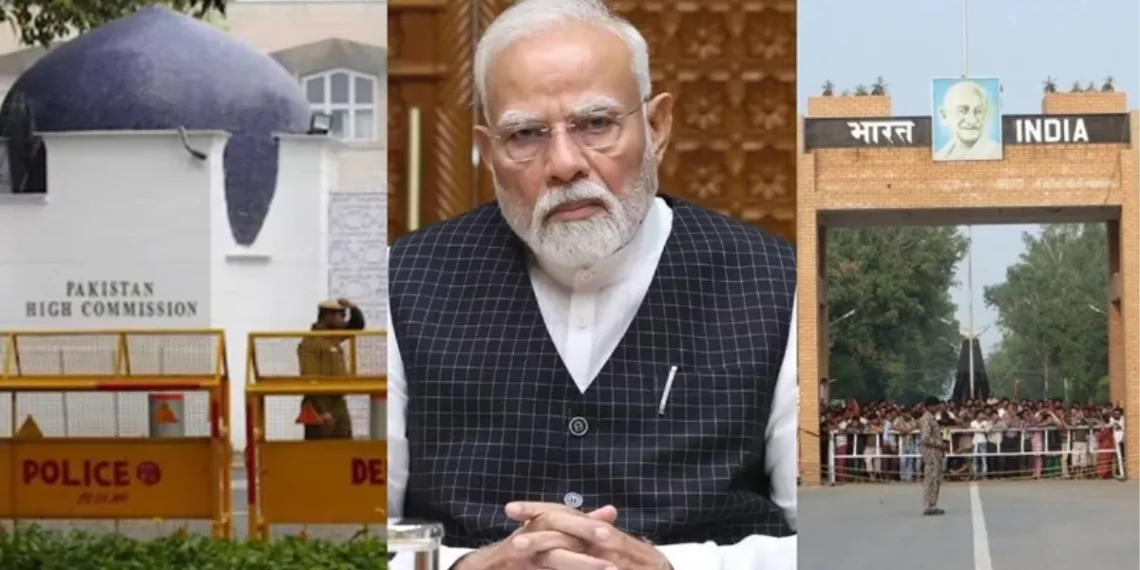The repercussions of the shocking Kashmir attack on innocent civilian Hindus are now begginingg to reverbate on a gigantic scale. India is seething with anger at the way it’s Hindu civilians have been targeted by terrorist entities in a religious attack backed by Pakistan. New Delhi has now begun its retaliation starting with diplomatic measures.
India’s External Affairs Ministry announced during a press briefing that Pakistani visas will be cancelled while the Wagah-Attari border between the two will be closed with immediate effect. Moreover, what may come as a devastating blow for Pakistan’s economy, will be the scrapping of the 65 year old Indus Water Sharing Treaty between the two countries which will also be suspended with immediate effect.
The River Sharing Treaty
The Indus Waters treaty was signed between the two countries in 1960. The Indus river system comprises the main river, Indus, and five left bank tributaries, i.e Ravi, Beas, Sutlej, Jhelum, and Chenab. Kabul, the right bank tributary, does not flow through India.
The Ravi, the Beas, and the Sutlej are together called Eastern rivers while the Chenab, the Jhelum and the Indus are called Western Rivers. Its waters are critical to both India and Pakistan.
Without the constraints of the treaty India is likely to assert more control over its rivers, fast-track hydro projects, and reduce cooperation—developments that could have devastating implications for Pakistan’s agriculture, energy, and economy.
India is likely to halt regulated water releases from the western rivers—Indus, Jhelum, and Chenab—which were previously governed under the IWT. While natural flows will continue, regulated releases from hydro projects such as Kishanganga and Ratle may stop, impacting Pakistan’s water availability during peak agricultural seasons.
Projects like the 330 MW Kishanganga Dam and the under-construction 850 MW Ratle Dam are expected to be prioritized. With the treaty suspended, India will look to redesign these projects without earlier constraints, potentially increasing water storage or modifying downstream flows—both of which have drawn past objections from Pakistan.
India is also expected to expedite use of its full share from the eastern rivers—Ravi, Beas, and Sutlej—via infrastructure like the Shahpurkandi Dam (completed in 2024) and the planned Ujh Dam. These efforts could significantly reduce the flow of surplus water into Pakistan—estimated at up to 9.3 billion cubic meters annually.
New Delhi is also likely to suspend water data sharing with Islamabad. This includes halting the exchange of real-time flow data and blocking future inspections of Indian hydro facilities by Pakistani officials.
Impact on Pakistan
Pakistan is primarily an agriculture based country with the majority of its waters flowing from India through the Indus. It has enjoyed India’s generosity where New Delhi has allowed even its own claimed share of water to flow through Pakistan. But now the treaty has been halted with immediate effect. Its impact on Pakistan will be far reaching.
Agricultural disruption: Roughly 80% of Pakistan’s irrigated land depends on the Indus system. Disruptions may reduce yields of key crops like wheat, rice, and cotton—critical to GDP and food security.
Groundwater stress: With surface flows reduced, farmers may turn to groundwater, worsening aquifer depletion and land salinization.
Power supply strain: Hydropower output from Tarbela and Mangla dams, which supply ~30% of electricity, may decline amid lower inflows.
Economic fallout: Reduced yields could impact rural employment, trigger defaults, and increase urban migration pressures on cities like Lahore and Karachi.
Soil degradation: Reduced irrigation may worsen salinity issues, already affecting 43% of arable land, risking long-term desertification.
Inter-provincial water tensions: Diminished flow could spark disputes among provinces, reviving historical tensions under the 1991 Water Accord.
Export setbacks: Agricultural exports like Basmati rice and textiles may shrink, hitting foreign exchange reserves and weakening the rupee.
Crop shift: Pakistan may need to adopt water-efficient crops such as millets, but infrastructure and training gaps may slow transition.
Pakistan Struggling to Respond
Pakistan had earlier remarked that it would consider cancellation of the treaty as an act of war. Islamabad has said that it will go to the UN if the treaty is cancelled.
Pakistan may also angle towards the 1969 Vienna convention on the law of treaties, which regulates the formation, regulation and termination of treaties between two sovereign states. However India is not a signatory to the Vienna Convention on the Law of Treaties.
Meanwhile India has also closed down the historic border between the two nations. The Attari-Wagah corridor has witnessed fluctuating figures in trade and passenger movement over the years. In 2023-24, the land port recorded trade worth Rs 3,886.53 crore with 6,871 cargo movements and 71,563 passenger crossings.
The Attari Land Port has long served as a critical trade conduit between India and Pakistan, handling a variety of goods. Key Indian exports through the route include soybean, chicken feed, vegetables, red chilies, plastic dana, and plastic yarn. On the other side, imports from Pakistan and beyond have largely comprised dry fruits, dry dates, gypsum, cement, glass, rock salt, and various herbs.
The closure of the port is expected to significantly impact the movement of these goods, particularly affecting small traders and manufacturers who rely on this cross-border exchange.
Pakistan has already been struggling economically, it has been asking for constant bailouts from the IMF to keep its economy functioning. Such moves by New Delhi may land a devastating blow to Islamabad.
However these measures by India are being seen as only a beginning of its retaliation towards constant terrorist targetings of its people by Paksitan. The 26 innocent civilians killed on religious grounds has sent shockwaves across the world and the anger in New Delhi has far from abayed. It is estimated that India will soon make military moves to safeguard its populace and rinse the region of the growing terror entities.








